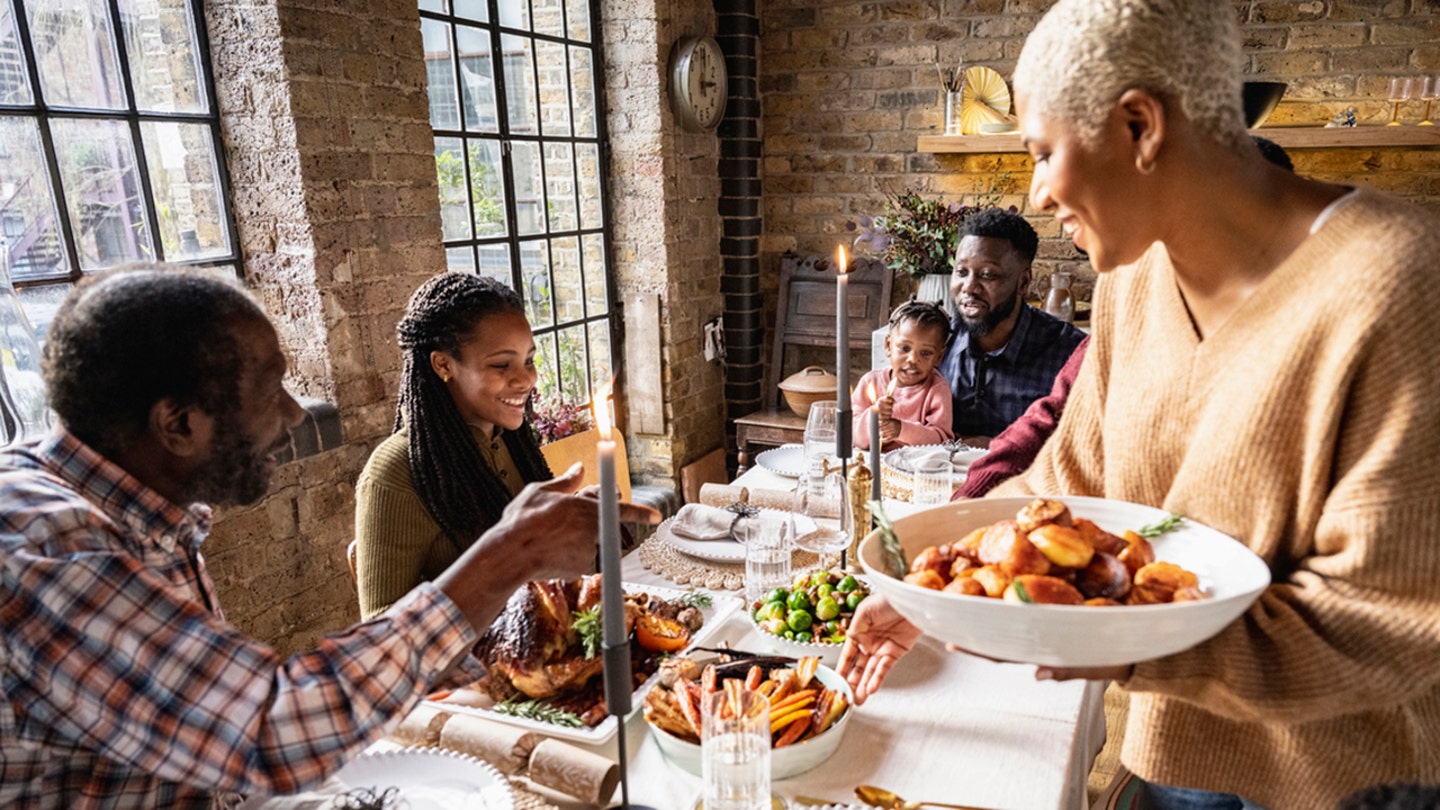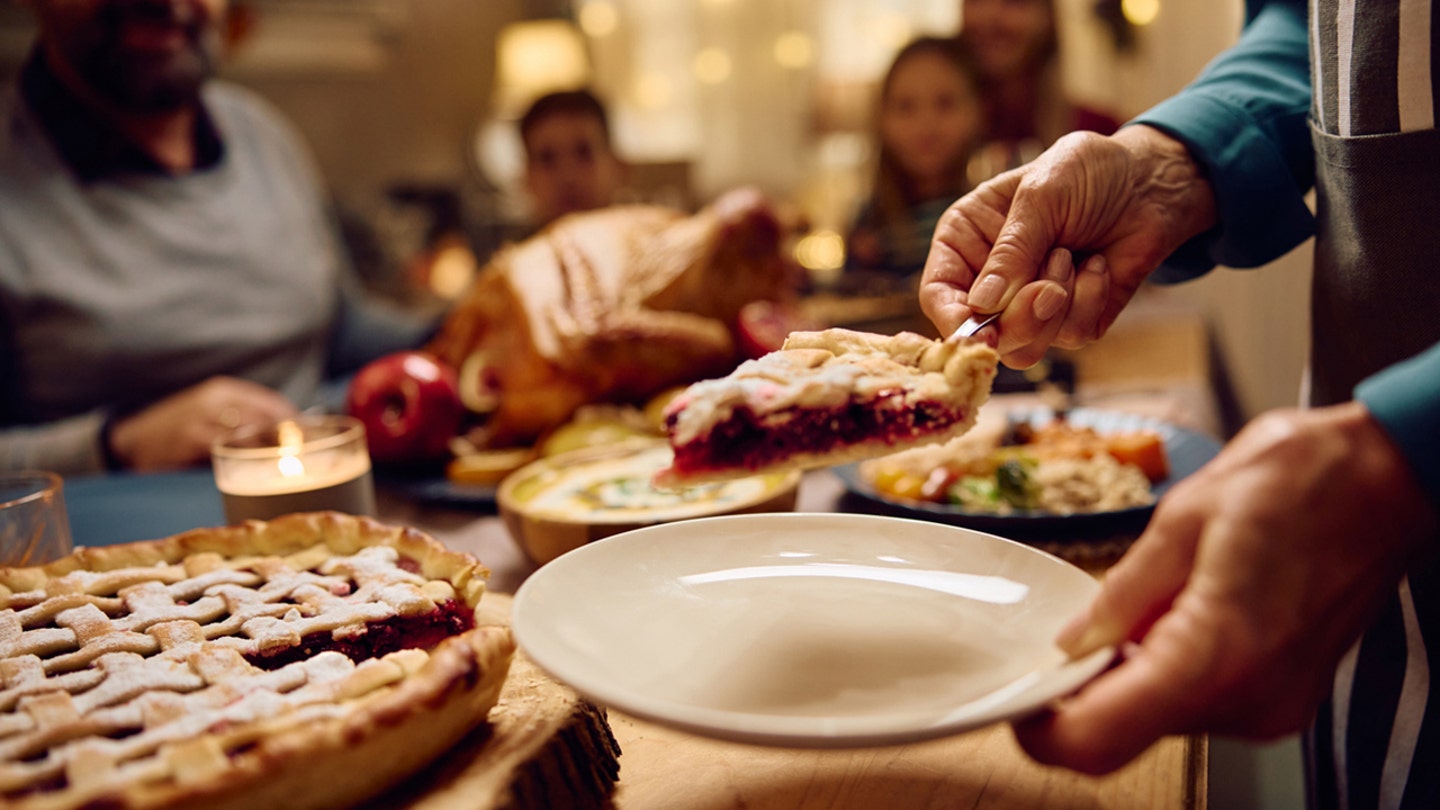[ad_1]
Spending the holidays around family and friends can stir up a lot of emotions.
And when festivities also incorporate lots of indulgent foods, it can be challenging to control emotional eating.
While the holidays are portrayed as a joyous season, it may not be the case for some, noted Dr. Brian Licuanan, a board-certified clinical psychologist in California.
AS ELECTION NEARS, STRESS EATING NEEDS A SHARP EYE: ‘IT’S DESTRUCTIVE BEHAVIOR’
“For a lot of people out there, this … part of the year is very emotionally distressing,,” he said in an interview with Fox News Digital.
“They could have had a past loss, or maybe they had a fallout in a marriage … maybe they’re navigating a medical condition.”

People tend to cope with stress through “comfort eating,” a psychologist said. (iStock)
Holidays can be a time of loneliness for those without family, Licuanan noted, as well as a “tumultuous” period for people who struggle with substance abuse.
“Comfort eating” is one way that people tend to cope with stress, he said.
5 WAYS TO SNEAK CDC’S HEALTHIEST VEGETABLE INTO YOUR DIET
“When stress levels increase, we [look] to soothe that,” he said.
“During the holiday season, when food is in abundance, it makes it a little bit more difficult.”

The holidays can heighten stress levels, isolation and depression for some, an expert cautioned. (iStock)
5 ways to curb emotional eating
Serena Poon, a certified celebrity nutritionist and longevity wellness expert in California, offered the following ways to rein in emotional eating during the holidays.
1. Acknowledge emotions and practice mindfulness
Recognizing the root causes of emotional cravings and practicing mindful habits can help with temptations, according to Poon.
“Suppressing emotions can lead to physical manifestations, as emotions are how our body communicates with us,” she told Fox News Digital during an interview.
ULTRA-PROCESSED FOODS MAKE UP 60% OF AMERICA’S DIET, WHO’S AT BIGGEST RISK
“Studies have shown that chronic stress can increase levels of cortisol, which not only amplifies cravings for sugary or comfort foods, but also impacts hormonal balance, gut health and even immunity,” Poon added.
The expert suggested trying a grounding exercise, like yoga or breath work, during times of stress.

Staying “emotionally resilient” can help support mental and physical health longevity, according to a wellness expert. (iStock)
Overindulging now and then doesn’t equate to failure, according to Poon.
“Practice self-compassion and focus on resetting at your next meal,” she advised.
“After a large holiday dinner, drink water, take a walk and plan a balanced breakfast with protein and fiber to reset your body and mindset.”
2. Set clear intentions
Being decisive about how to act at a gathering, whether socializing or eating, can help curb emotional impulses.
“For example, focus on having meaningful conversations or savoring one favorite dessert rather than sampling everything,” Poon suggested. “Setting intentions creates mindfulness and empowers decision-making.”
THESE 6 ‘HEALTHY’ FOODS WON’T HELP YOU LOST WEIGHT, NUTRITIONIST WARNS
For example, “If mashed potatoes are your weakness, decide beforehand that you’ll enjoy one serving guilt-free while prioritizing vegetables and protein on your plate,” she went on.
“This approach encourages mindful indulgence and reduces guilt.”

Experts encourage people to reach first for high-protein and high-fiber options at the dinner table. (iStock)
3. Stay hydrated and slow down
Dehydration can often be mistaken for hunger, according to Poon, who recommends drinking water throughout the day to help curb “unnecessary cravings.”
“Begin your holiday dinner with a salad or vegetable soup before indulging in heavier dishes,” she suggested. “Pair it with a glass of water or herbal tea.”

As dehydration can often be mistaken for hunger, experts recommend drinking water throughout the day to help curb cravings. (iStock)
Poon also suggested pausing and taking three slow, deep breaths when cravings strike.
“If you feel drawn to the dessert table out of habit, pause and breathe deeply for a moment to assess whether it’s hunger or stress that’s motivating you,” she advised.
“Put your fork down between bites, chew thoroughly, and focus on the flavors and textures of your food.”
“This simple act activates the parasympathetic nervous system, calming stress and allowing for more intentional food choices.”
Getting into the habit of eating slowly and mindfully allows the body to register fullness as you enjoy your food, Poon added.
CLICK HERE TO SIGN UP FOR OUR HEALTH NEWSLETTER
“Put your fork down between bites, chew thoroughly, and focus on the flavors and textures of your food,” she advised.
“This not only enhances your experience, but also helps to regulate appetite.”
4. Introduce non-food celebrations or healthy alternatives
The holidays don’t have to revolve around just food, Poon noted.
Instead, she encouraged exploring non-food rewards and activities like decorating, playing games, volunteering or spending quality time with loved ones.

Creating lower-calorie dishes for the holidays will lead to less guilt, experts suggest. (iStock)
Poon also suggested bringing healthier versions of traditional holiday dishes, like mashed cauliflower instead of potatoes or low-sugar sweets.
“Swapping traditional recipes for healthier options can help balance indulgence with nutrition,” she said.
5. Prioritize sleep and self-care
Sleep deprivation can increase the hunger hormone (ghrelin) and decrease leptin, the satiety hormone, which can make cravings harder to resist, Poon mentioned.
CLICK HERE TO GET THE FOX NEWS APP
“Aim for quality, restorative sleep,” she suggested. “Poor sleep has been linked to increased caloric intake and cravings for high-fat, high-sugar foods.”
For more Health articles, visit foxnews.com/health
“By cultivating a mindful approach to eating, integrating gratitude and self-care, and addressing the root causes of emotional cravings, you can enjoy the holiday season with balance and joy.”
Emotional eating is not about perfection, the expert said, but about “creating a sustainable, compassionate relationship with your body and emotions.”

Licuanan encouraged Americans to take this time to “reconnect with people.”
“Get back to those relationships and connections that you really value,” he said.
[ad_2]
Source link

